Company Law Report: Incorporation, Shares, Directors, and Meetings
VerifiedAdded on 2020/07/23
|20
|6503
|194
Report
AI Summary
This report provides a comprehensive overview of company law, beginning with the concept of corporate personality and the implications of lifting the corporate veil. It analyzes the advantages and disadvantages of incorporation, the laws surrounding promoters and pre-incorporation contracts, and the requirements for registration and commencement of trading. The report then delves into the memorandum and articles of association, the doctrine of ultra vires, and the contents of a prospectus. Further sections explore different types of capital, the laws on the issue of shares, class rights, dividends, and capital maintenance, as well as insider dealing. It also examines the duties and powers of directors, the rules on different types of meetings, minority protection, and the rights of shareholders and debenture holders, concluding with a discussion on rights in liquidation. The report uses case studies and legal principles to illustrate key concepts within the realm of company law.

COMPANY LAW
Paraphrase This Document
Need a fresh take? Get an instant paraphrase of this document with our AI Paraphraser
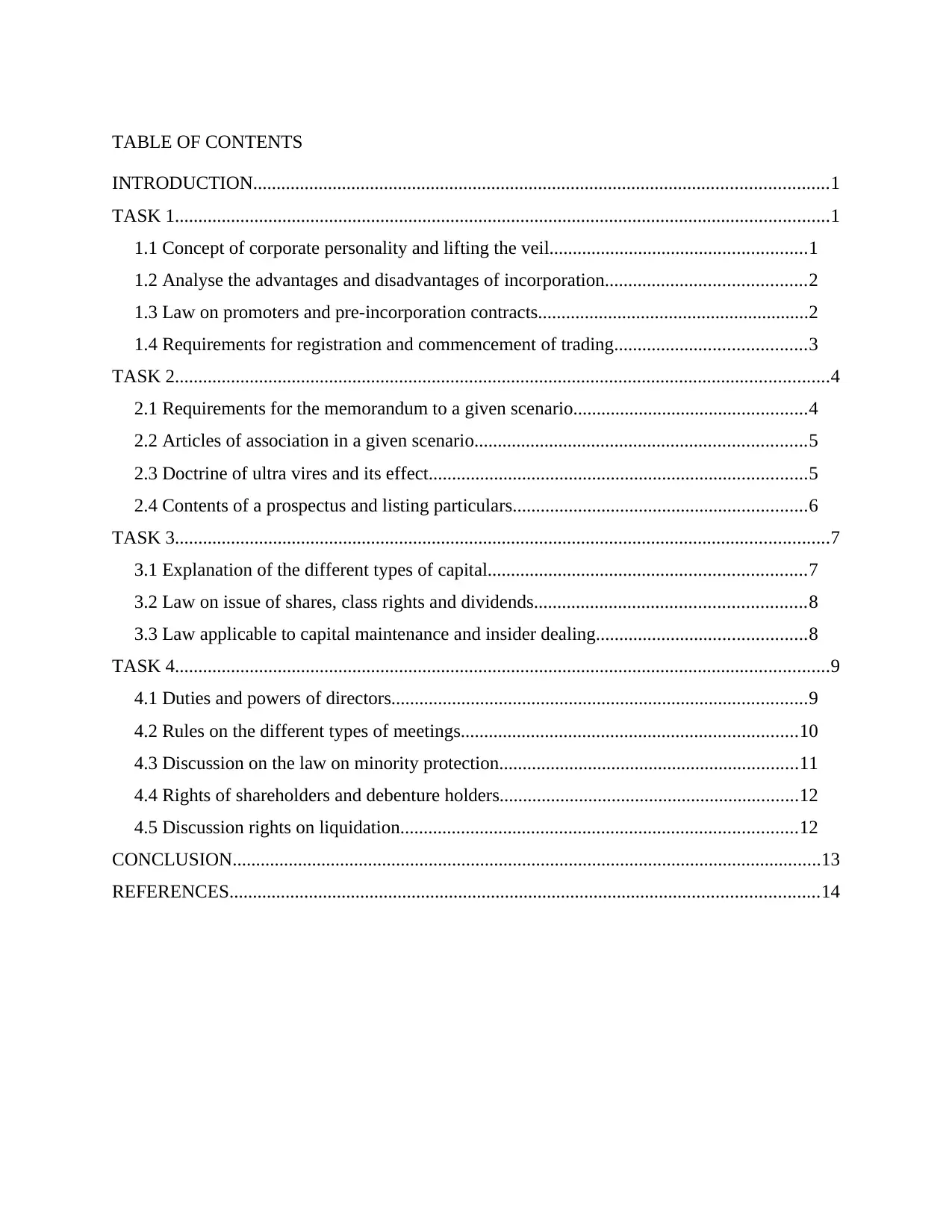
TABLE OF CONTENTS
INTRODUCTION...........................................................................................................................1
TASK 1............................................................................................................................................1
1.1 Concept of corporate personality and lifting the veil.......................................................1
1.2 Analyse the advantages and disadvantages of incorporation...........................................2
1.3 Law on promoters and pre-incorporation contracts..........................................................2
1.4 Requirements for registration and commencement of trading.........................................3
TASK 2............................................................................................................................................4
2.1 Requirements for the memorandum to a given scenario..................................................4
2.2 Articles of association in a given scenario.......................................................................5
2.3 Doctrine of ultra vires and its effect.................................................................................5
2.4 Contents of a prospectus and listing particulars...............................................................6
TASK 3............................................................................................................................................7
3.1 Explanation of the different types of capital....................................................................7
3.2 Law on issue of shares, class rights and dividends..........................................................8
3.3 Law applicable to capital maintenance and insider dealing.............................................8
TASK 4............................................................................................................................................9
4.1 Duties and powers of directors.........................................................................................9
4.2 Rules on the different types of meetings........................................................................10
4.3 Discussion on the law on minority protection................................................................11
4.4 Rights of shareholders and debenture holders................................................................12
4.5 Discussion rights on liquidation.....................................................................................12
CONCLUSION..............................................................................................................................13
REFERENCES..............................................................................................................................14
INTRODUCTION...........................................................................................................................1
TASK 1............................................................................................................................................1
1.1 Concept of corporate personality and lifting the veil.......................................................1
1.2 Analyse the advantages and disadvantages of incorporation...........................................2
1.3 Law on promoters and pre-incorporation contracts..........................................................2
1.4 Requirements for registration and commencement of trading.........................................3
TASK 2............................................................................................................................................4
2.1 Requirements for the memorandum to a given scenario..................................................4
2.2 Articles of association in a given scenario.......................................................................5
2.3 Doctrine of ultra vires and its effect.................................................................................5
2.4 Contents of a prospectus and listing particulars...............................................................6
TASK 3............................................................................................................................................7
3.1 Explanation of the different types of capital....................................................................7
3.2 Law on issue of shares, class rights and dividends..........................................................8
3.3 Law applicable to capital maintenance and insider dealing.............................................8
TASK 4............................................................................................................................................9
4.1 Duties and powers of directors.........................................................................................9
4.2 Rules on the different types of meetings........................................................................10
4.3 Discussion on the law on minority protection................................................................11
4.4 Rights of shareholders and debenture holders................................................................12
4.5 Discussion rights on liquidation.....................................................................................12
CONCLUSION..............................................................................................................................13
REFERENCES..............................................................................................................................14
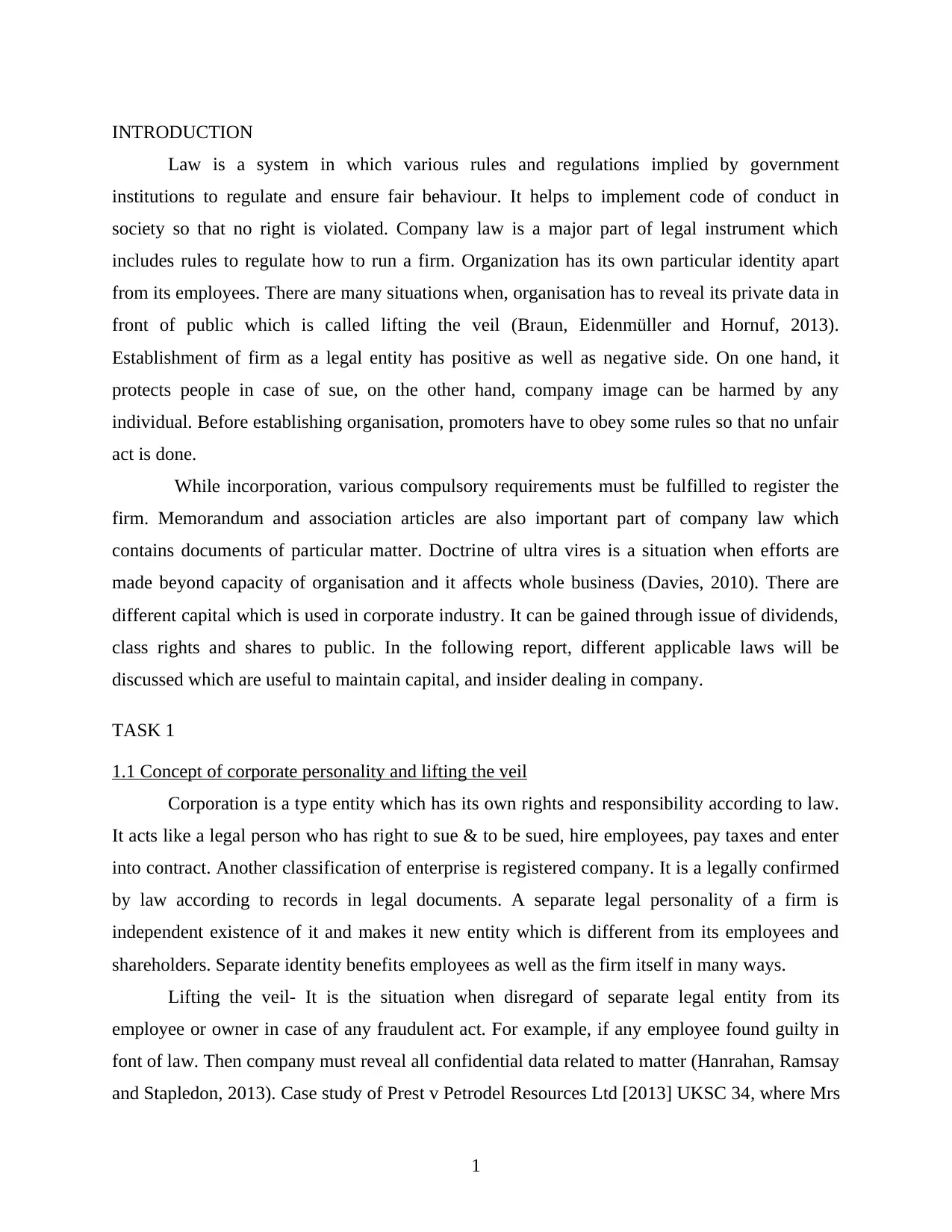
INTRODUCTION
Law is a system in which various rules and regulations implied by government
institutions to regulate and ensure fair behaviour. It helps to implement code of conduct in
society so that no right is violated. Company law is a major part of legal instrument which
includes rules to regulate how to run a firm. Organization has its own particular identity apart
from its employees. There are many situations when, organisation has to reveal its private data in
front of public which is called lifting the veil (Braun, Eidenmüller and Hornuf, 2013).
Establishment of firm as a legal entity has positive as well as negative side. On one hand, it
protects people in case of sue, on the other hand, company image can be harmed by any
individual. Before establishing organisation, promoters have to obey some rules so that no unfair
act is done.
While incorporation, various compulsory requirements must be fulfilled to register the
firm. Memorandum and association articles are also important part of company law which
contains documents of particular matter. Doctrine of ultra vires is a situation when efforts are
made beyond capacity of organisation and it affects whole business (Davies, 2010). There are
different capital which is used in corporate industry. It can be gained through issue of dividends,
class rights and shares to public. In the following report, different applicable laws will be
discussed which are useful to maintain capital, and insider dealing in company.
TASK 1
1.1 Concept of corporate personality and lifting the veil
Corporation is a type entity which has its own rights and responsibility according to law.
It acts like a legal person who has right to sue & to be sued, hire employees, pay taxes and enter
into contract. Another classification of enterprise is registered company. It is a legally confirmed
by law according to records in legal documents. A separate legal personality of a firm is
independent existence of it and makes it new entity which is different from its employees and
shareholders. Separate identity benefits employees as well as the firm itself in many ways.
Lifting the veil- It is the situation when disregard of separate legal entity from its
employee or owner in case of any fraudulent act. For example, if any employee found guilty in
font of law. Then company must reveal all confidential data related to matter (Hanrahan, Ramsay
and Stapledon, 2013). Case study of Prest v Petrodel Resources Ltd [2013] UKSC 34, where Mrs
1
Law is a system in which various rules and regulations implied by government
institutions to regulate and ensure fair behaviour. It helps to implement code of conduct in
society so that no right is violated. Company law is a major part of legal instrument which
includes rules to regulate how to run a firm. Organization has its own particular identity apart
from its employees. There are many situations when, organisation has to reveal its private data in
front of public which is called lifting the veil (Braun, Eidenmüller and Hornuf, 2013).
Establishment of firm as a legal entity has positive as well as negative side. On one hand, it
protects people in case of sue, on the other hand, company image can be harmed by any
individual. Before establishing organisation, promoters have to obey some rules so that no unfair
act is done.
While incorporation, various compulsory requirements must be fulfilled to register the
firm. Memorandum and association articles are also important part of company law which
contains documents of particular matter. Doctrine of ultra vires is a situation when efforts are
made beyond capacity of organisation and it affects whole business (Davies, 2010). There are
different capital which is used in corporate industry. It can be gained through issue of dividends,
class rights and shares to public. In the following report, different applicable laws will be
discussed which are useful to maintain capital, and insider dealing in company.
TASK 1
1.1 Concept of corporate personality and lifting the veil
Corporation is a type entity which has its own rights and responsibility according to law.
It acts like a legal person who has right to sue & to be sued, hire employees, pay taxes and enter
into contract. Another classification of enterprise is registered company. It is a legally confirmed
by law according to records in legal documents. A separate legal personality of a firm is
independent existence of it and makes it new entity which is different from its employees and
shareholders. Separate identity benefits employees as well as the firm itself in many ways.
Lifting the veil- It is the situation when disregard of separate legal entity from its
employee or owner in case of any fraudulent act. For example, if any employee found guilty in
font of law. Then company must reveal all confidential data related to matter (Hanrahan, Ramsay
and Stapledon, 2013). Case study of Prest v Petrodel Resources Ltd [2013] UKSC 34, where Mrs
1
⊘ This is a preview!⊘
Do you want full access?
Subscribe today to unlock all pages.

Trusted by 1+ million students worldwide
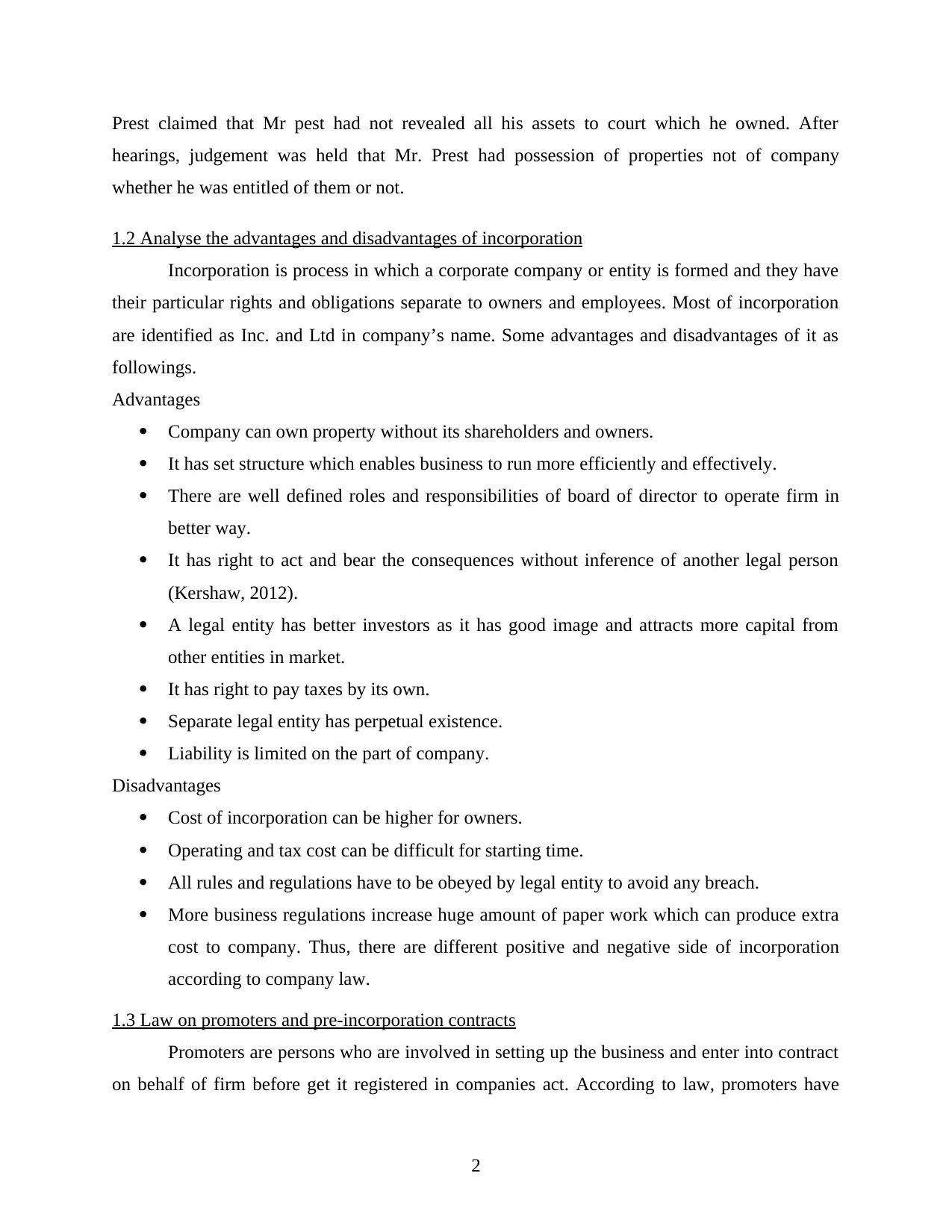
Prest claimed that Mr pest had not revealed all his assets to court which he owned. After
hearings, judgement was held that Mr. Prest had possession of properties not of company
whether he was entitled of them or not.
1.2 Analyse the advantages and disadvantages of incorporation
Incorporation is process in which a corporate company or entity is formed and they have
their particular rights and obligations separate to owners and employees. Most of incorporation
are identified as Inc. and Ltd in company’s name. Some advantages and disadvantages of it as
followings.
Advantages
Company can own property without its shareholders and owners.
It has set structure which enables business to run more efficiently and effectively.
There are well defined roles and responsibilities of board of director to operate firm in
better way.
It has right to act and bear the consequences without inference of another legal person
(Kershaw, 2012).
A legal entity has better investors as it has good image and attracts more capital from
other entities in market.
It has right to pay taxes by its own.
Separate legal entity has perpetual existence.
Liability is limited on the part of company.
Disadvantages
Cost of incorporation can be higher for owners.
Operating and tax cost can be difficult for starting time.
All rules and regulations have to be obeyed by legal entity to avoid any breach.
More business regulations increase huge amount of paper work which can produce extra
cost to company. Thus, there are different positive and negative side of incorporation
according to company law.
1.3 Law on promoters and pre-incorporation contracts
Promoters are persons who are involved in setting up the business and enter into contract
on behalf of firm before get it registered in companies act. According to law, promoters have
2
hearings, judgement was held that Mr. Prest had possession of properties not of company
whether he was entitled of them or not.
1.2 Analyse the advantages and disadvantages of incorporation
Incorporation is process in which a corporate company or entity is formed and they have
their particular rights and obligations separate to owners and employees. Most of incorporation
are identified as Inc. and Ltd in company’s name. Some advantages and disadvantages of it as
followings.
Advantages
Company can own property without its shareholders and owners.
It has set structure which enables business to run more efficiently and effectively.
There are well defined roles and responsibilities of board of director to operate firm in
better way.
It has right to act and bear the consequences without inference of another legal person
(Kershaw, 2012).
A legal entity has better investors as it has good image and attracts more capital from
other entities in market.
It has right to pay taxes by its own.
Separate legal entity has perpetual existence.
Liability is limited on the part of company.
Disadvantages
Cost of incorporation can be higher for owners.
Operating and tax cost can be difficult for starting time.
All rules and regulations have to be obeyed by legal entity to avoid any breach.
More business regulations increase huge amount of paper work which can produce extra
cost to company. Thus, there are different positive and negative side of incorporation
according to company law.
1.3 Law on promoters and pre-incorporation contracts
Promoters are persons who are involved in setting up the business and enter into contract
on behalf of firm before get it registered in companies act. According to law, promoters have
2
Paraphrase This Document
Need a fresh take? Get an instant paraphrase of this document with our AI Paraphraser
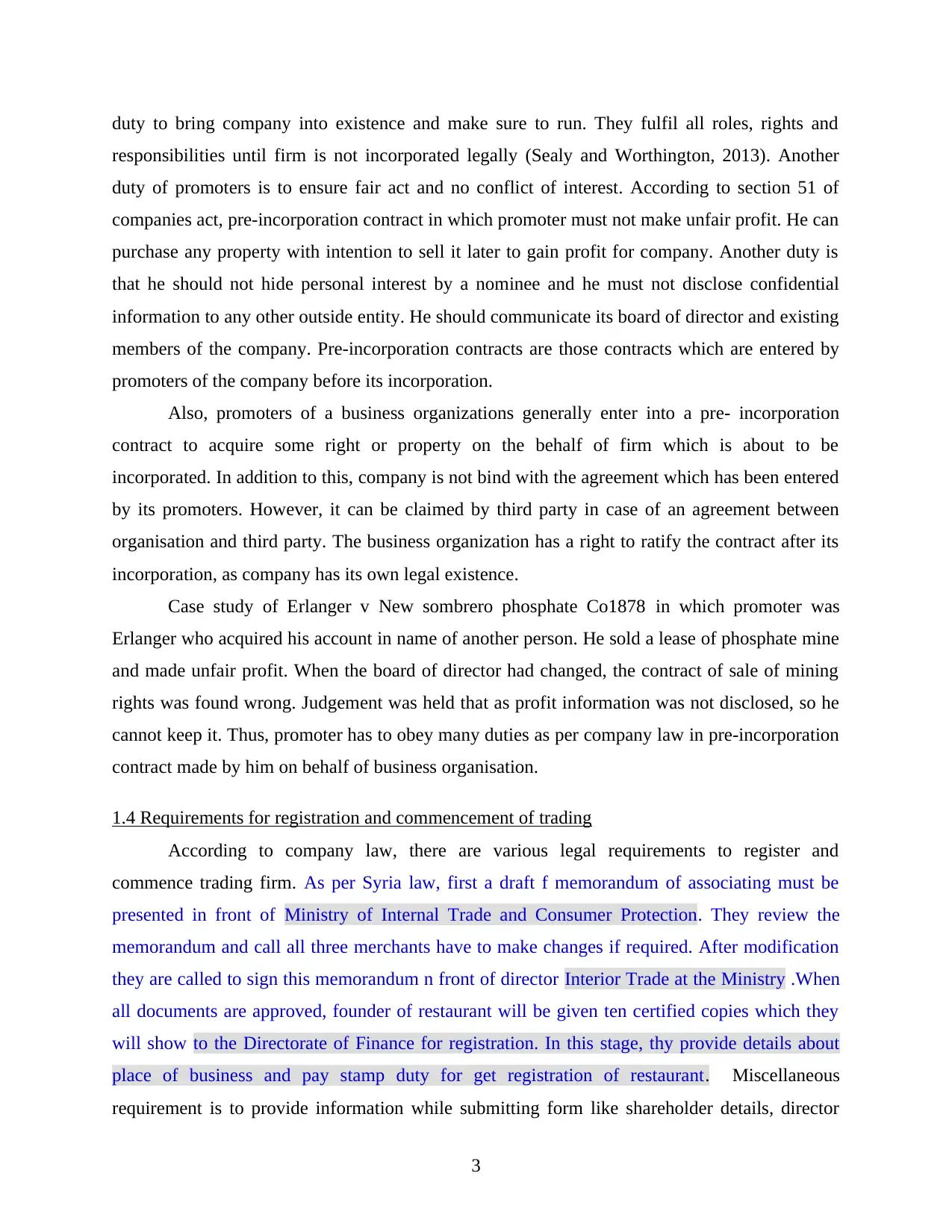
duty to bring company into existence and make sure to run. They fulfil all roles, rights and
responsibilities until firm is not incorporated legally (Sealy and Worthington, 2013). Another
duty of promoters is to ensure fair act and no conflict of interest. According to section 51 of
companies act, pre-incorporation contract in which promoter must not make unfair profit. He can
purchase any property with intention to sell it later to gain profit for company. Another duty is
that he should not hide personal interest by a nominee and he must not disclose confidential
information to any other outside entity. He should communicate its board of director and existing
members of the company. Pre-incorporation contracts are those contracts which are entered by
promoters of the company before its incorporation.
Also, promoters of a business organizations generally enter into a pre- incorporation
contract to acquire some right or property on the behalf of firm which is about to be
incorporated. In addition to this, company is not bind with the agreement which has been entered
by its promoters. However, it can be claimed by third party in case of an agreement between
organisation and third party. The business organization has a right to ratify the contract after its
incorporation, as company has its own legal existence.
Case study of Erlanger v New sombrero phosphate Co1878 in which promoter was
Erlanger who acquired his account in name of another person. He sold a lease of phosphate mine
and made unfair profit. When the board of director had changed, the contract of sale of mining
rights was found wrong. Judgement was held that as profit information was not disclosed, so he
cannot keep it. Thus, promoter has to obey many duties as per company law in pre-incorporation
contract made by him on behalf of business organisation.
1.4 Requirements for registration and commencement of trading
According to company law, there are various legal requirements to register and
commence trading firm. As per Syria law, first a draft f memorandum of associating must be
presented in front of Ministry of Internal Trade and Consumer Protection. They review the
memorandum and call all three merchants have to make changes if required. After modification
they are called to sign this memorandum n front of director Interior Trade at the Ministry .When
all documents are approved, founder of restaurant will be given ten certified copies which they
will show to the Directorate of Finance for registration. In this stage, thy provide details about
place of business and pay stamp duty for get registration of restaurant. Miscellaneous
requirement is to provide information while submitting form like shareholder details, director
3
responsibilities until firm is not incorporated legally (Sealy and Worthington, 2013). Another
duty of promoters is to ensure fair act and no conflict of interest. According to section 51 of
companies act, pre-incorporation contract in which promoter must not make unfair profit. He can
purchase any property with intention to sell it later to gain profit for company. Another duty is
that he should not hide personal interest by a nominee and he must not disclose confidential
information to any other outside entity. He should communicate its board of director and existing
members of the company. Pre-incorporation contracts are those contracts which are entered by
promoters of the company before its incorporation.
Also, promoters of a business organizations generally enter into a pre- incorporation
contract to acquire some right or property on the behalf of firm which is about to be
incorporated. In addition to this, company is not bind with the agreement which has been entered
by its promoters. However, it can be claimed by third party in case of an agreement between
organisation and third party. The business organization has a right to ratify the contract after its
incorporation, as company has its own legal existence.
Case study of Erlanger v New sombrero phosphate Co1878 in which promoter was
Erlanger who acquired his account in name of another person. He sold a lease of phosphate mine
and made unfair profit. When the board of director had changed, the contract of sale of mining
rights was found wrong. Judgement was held that as profit information was not disclosed, so he
cannot keep it. Thus, promoter has to obey many duties as per company law in pre-incorporation
contract made by him on behalf of business organisation.
1.4 Requirements for registration and commencement of trading
According to company law, there are various legal requirements to register and
commence trading firm. As per Syria law, first a draft f memorandum of associating must be
presented in front of Ministry of Internal Trade and Consumer Protection. They review the
memorandum and call all three merchants have to make changes if required. After modification
they are called to sign this memorandum n front of director Interior Trade at the Ministry .When
all documents are approved, founder of restaurant will be given ten certified copies which they
will show to the Directorate of Finance for registration. In this stage, thy provide details about
place of business and pay stamp duty for get registration of restaurant. Miscellaneous
requirement is to provide information while submitting form like shareholder details, director
3
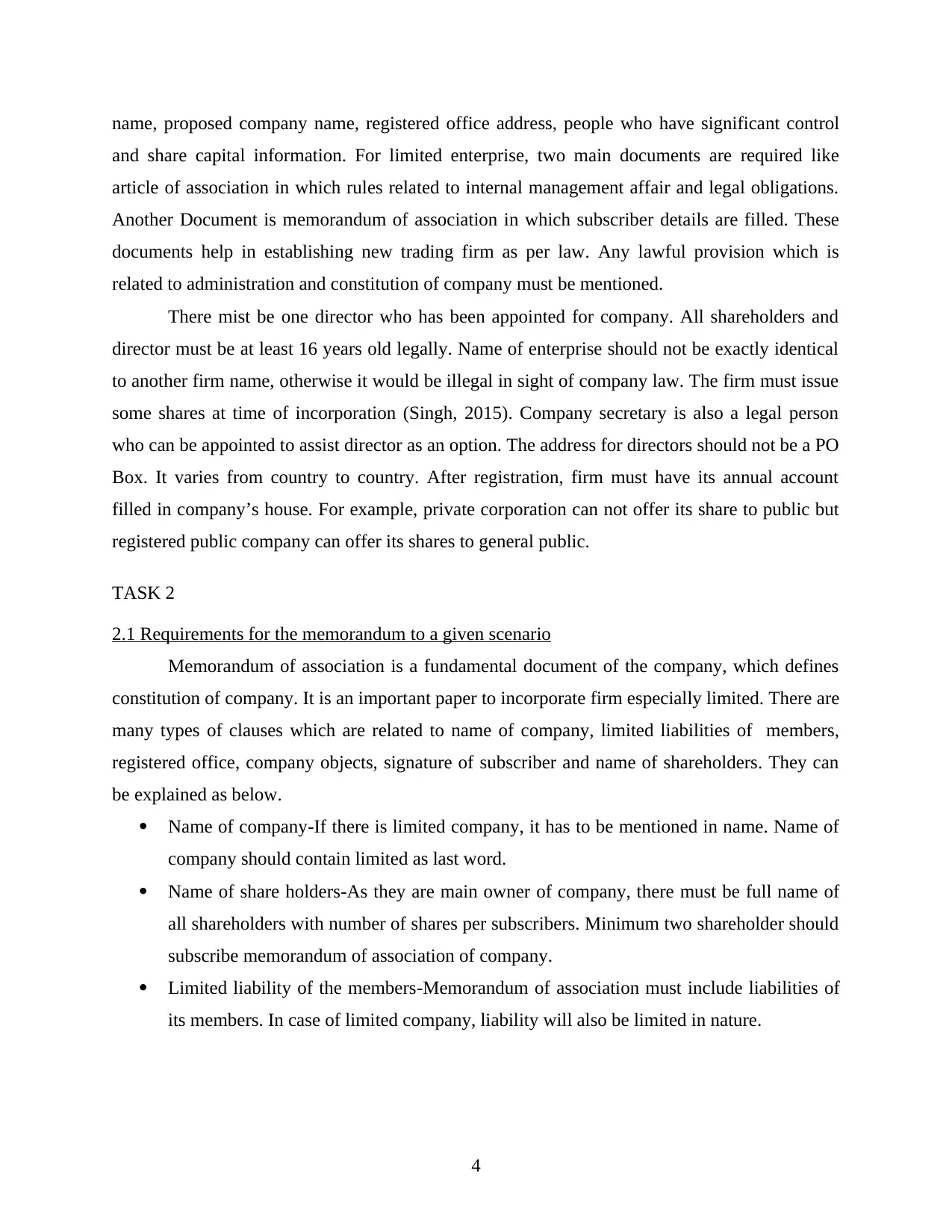
name, proposed company name, registered office address, people who have significant control
and share capital information. For limited enterprise, two main documents are required like
article of association in which rules related to internal management affair and legal obligations.
Another Document is memorandum of association in which subscriber details are filled. These
documents help in establishing new trading firm as per law. Any lawful provision which is
related to administration and constitution of company must be mentioned.
There mist be one director who has been appointed for company. All shareholders and
director must be at least 16 years old legally. Name of enterprise should not be exactly identical
to another firm name, otherwise it would be illegal in sight of company law. The firm must issue
some shares at time of incorporation (Singh, 2015). Company secretary is also a legal person
who can be appointed to assist director as an option. The address for directors should not be a PO
Box. It varies from country to country. After registration, firm must have its annual account
filled in company’s house. For example, private corporation can not offer its share to public but
registered public company can offer its shares to general public.
TASK 2
2.1 Requirements for the memorandum to a given scenario
Memorandum of association is a fundamental document of the company, which defines
constitution of company. It is an important paper to incorporate firm especially limited. There are
many types of clauses which are related to name of company, limited liabilities of members,
registered office, company objects, signature of subscriber and name of shareholders. They can
be explained as below.
Name of company-If there is limited company, it has to be mentioned in name. Name of
company should contain limited as last word.
Name of share holders-As they are main owner of company, there must be full name of
all shareholders with number of shares per subscribers. Minimum two shareholder should
subscribe memorandum of association of company.
Limited liability of the members-Memorandum of association must include liabilities of
its members. In case of limited company, liability will also be limited in nature.
4
and share capital information. For limited enterprise, two main documents are required like
article of association in which rules related to internal management affair and legal obligations.
Another Document is memorandum of association in which subscriber details are filled. These
documents help in establishing new trading firm as per law. Any lawful provision which is
related to administration and constitution of company must be mentioned.
There mist be one director who has been appointed for company. All shareholders and
director must be at least 16 years old legally. Name of enterprise should not be exactly identical
to another firm name, otherwise it would be illegal in sight of company law. The firm must issue
some shares at time of incorporation (Singh, 2015). Company secretary is also a legal person
who can be appointed to assist director as an option. The address for directors should not be a PO
Box. It varies from country to country. After registration, firm must have its annual account
filled in company’s house. For example, private corporation can not offer its share to public but
registered public company can offer its shares to general public.
TASK 2
2.1 Requirements for the memorandum to a given scenario
Memorandum of association is a fundamental document of the company, which defines
constitution of company. It is an important paper to incorporate firm especially limited. There are
many types of clauses which are related to name of company, limited liabilities of members,
registered office, company objects, signature of subscriber and name of shareholders. They can
be explained as below.
Name of company-If there is limited company, it has to be mentioned in name. Name of
company should contain limited as last word.
Name of share holders-As they are main owner of company, there must be full name of
all shareholders with number of shares per subscribers. Minimum two shareholder should
subscribe memorandum of association of company.
Limited liability of the members-Memorandum of association must include liabilities of
its members. In case of limited company, liability will also be limited in nature.
4
⊘ This is a preview!⊘
Do you want full access?
Subscribe today to unlock all pages.

Trusted by 1+ million students worldwide
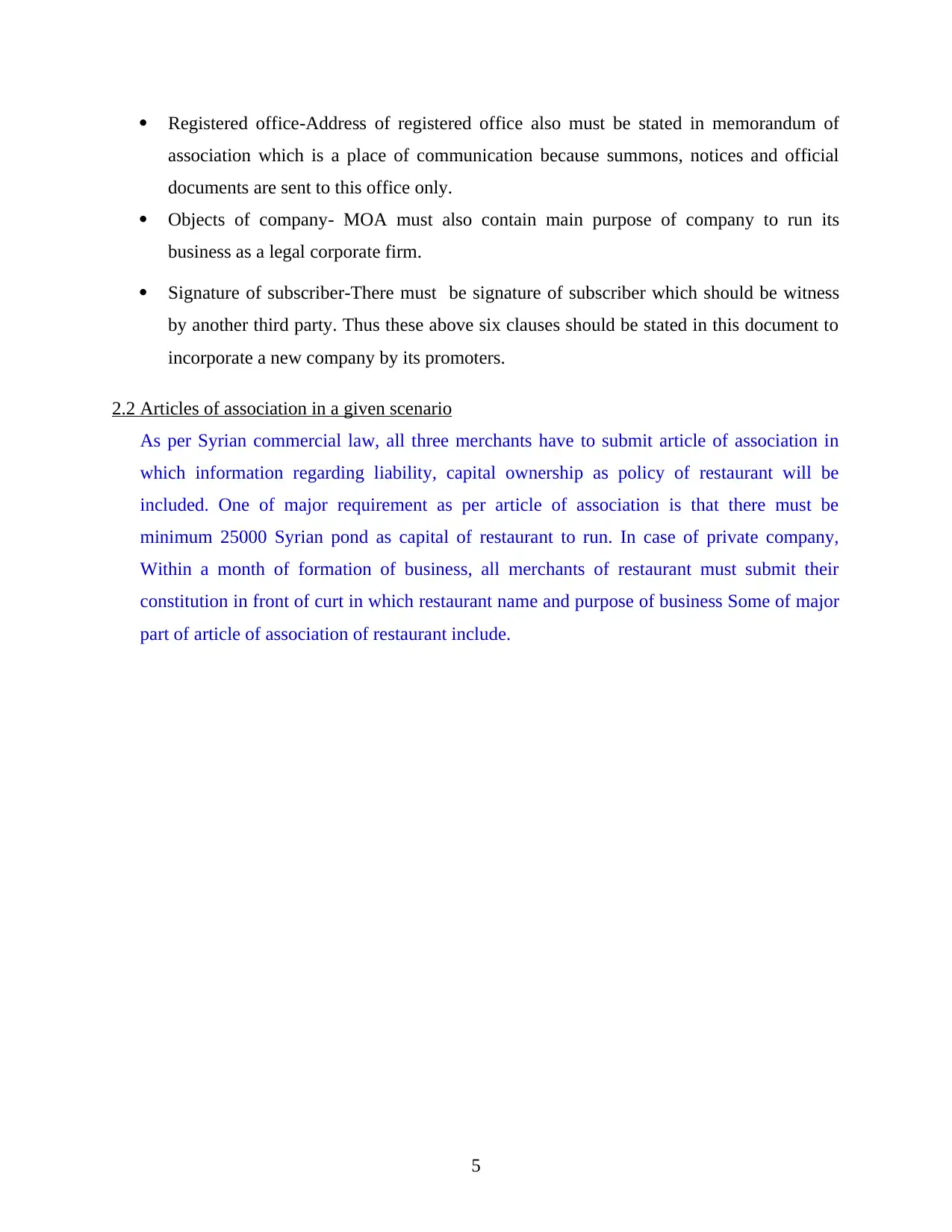
Registered office-Address of registered office also must be stated in memorandum of
association which is a place of communication because summons, notices and official
documents are sent to this office only.
Objects of company- MOA must also contain main purpose of company to run its
business as a legal corporate firm.
Signature of subscriber-There must be signature of subscriber which should be witness
by another third party. Thus these above six clauses should be stated in this document to
incorporate a new company by its promoters.
2.2 Articles of association in a given scenario
As per Syrian commercial law, all three merchants have to submit article of association in
which information regarding liability, capital ownership as policy of restaurant will be
included. One of major requirement as per article of association is that there must be
minimum 25000 Syrian pond as capital of restaurant to run. In case of private company,
Within a month of formation of business, all merchants of restaurant must submit their
constitution in front of curt in which restaurant name and purpose of business Some of major
part of article of association of restaurant include.
5
association which is a place of communication because summons, notices and official
documents are sent to this office only.
Objects of company- MOA must also contain main purpose of company to run its
business as a legal corporate firm.
Signature of subscriber-There must be signature of subscriber which should be witness
by another third party. Thus these above six clauses should be stated in this document to
incorporate a new company by its promoters.
2.2 Articles of association in a given scenario
As per Syrian commercial law, all three merchants have to submit article of association in
which information regarding liability, capital ownership as policy of restaurant will be
included. One of major requirement as per article of association is that there must be
minimum 25000 Syrian pond as capital of restaurant to run. In case of private company,
Within a month of formation of business, all merchants of restaurant must submit their
constitution in front of curt in which restaurant name and purpose of business Some of major
part of article of association of restaurant include.
5
Paraphrase This Document
Need a fresh take? Get an instant paraphrase of this document with our AI Paraphraser
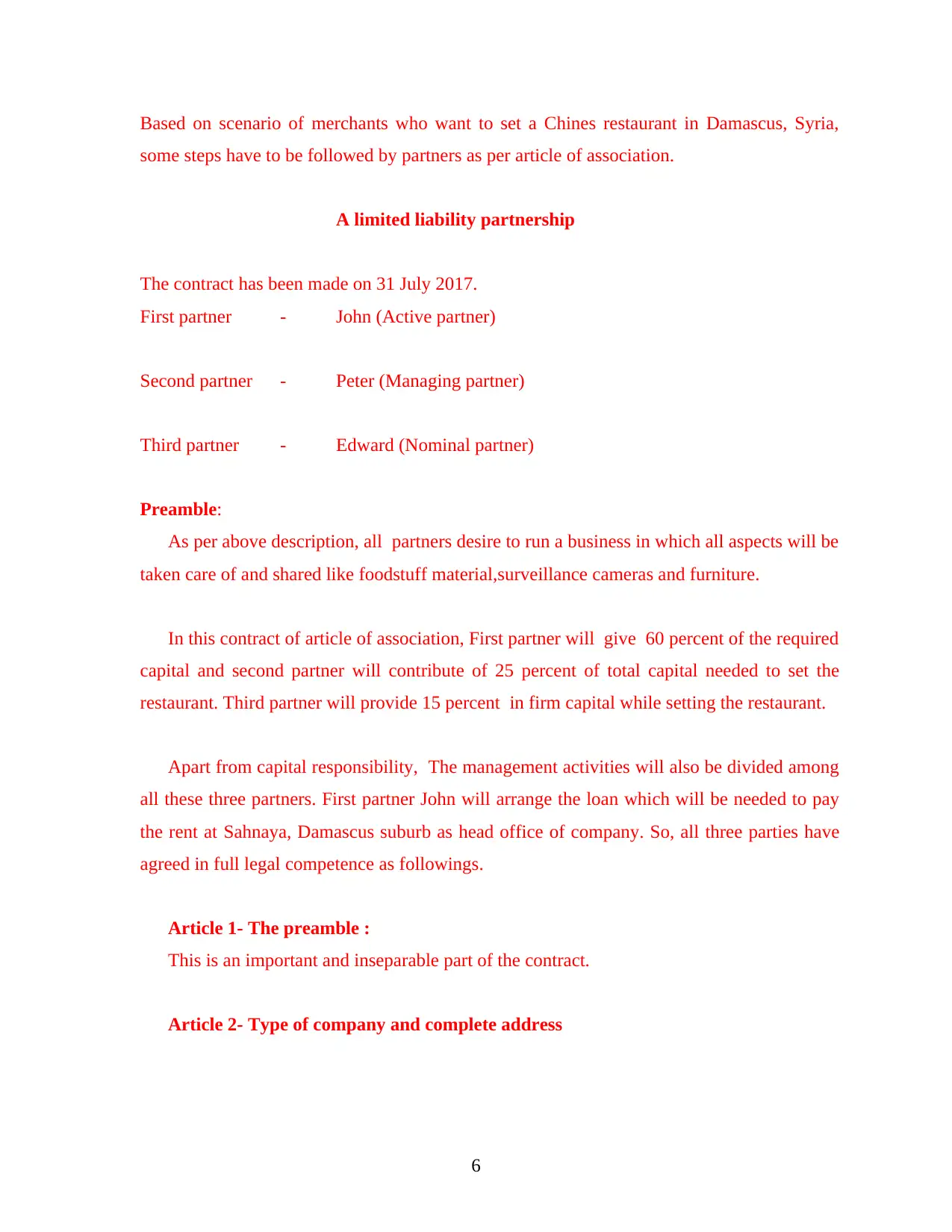
Based on scenario of merchants who want to set a Chines restaurant in Damascus, Syria,
some steps have to be followed by partners as per article of association.
A limited liability partnership
The contract has been made on 31 July 2017.
First partner - John (Active partner)
Second partner - Peter (Managing partner)
Third partner - Edward (Nominal partner)
Preamble:
As per above description, all partners desire to run a business in which all aspects will be
taken care of and shared like foodstuff material,surveillance cameras and furniture.
In this contract of article of association, First partner will give 60 percent of the required
capital and second partner will contribute of 25 percent of total capital needed to set the
restaurant. Third partner will provide 15 percent in firm capital while setting the restaurant.
Apart from capital responsibility, The management activities will also be divided among
all these three partners. First partner John will arrange the loan which will be needed to pay
the rent at Sahnaya, Damascus suburb as head office of company. So, all three parties have
agreed in full legal competence as followings.
Article 1- The preamble :
This is an important and inseparable part of the contract.
Article 2- Type of company and complete address
6
some steps have to be followed by partners as per article of association.
A limited liability partnership
The contract has been made on 31 July 2017.
First partner - John (Active partner)
Second partner - Peter (Managing partner)
Third partner - Edward (Nominal partner)
Preamble:
As per above description, all partners desire to run a business in which all aspects will be
taken care of and shared like foodstuff material,surveillance cameras and furniture.
In this contract of article of association, First partner will give 60 percent of the required
capital and second partner will contribute of 25 percent of total capital needed to set the
restaurant. Third partner will provide 15 percent in firm capital while setting the restaurant.
Apart from capital responsibility, The management activities will also be divided among
all these three partners. First partner John will arrange the loan which will be needed to pay
the rent at Sahnaya, Damascus suburb as head office of company. So, all three parties have
agreed in full legal competence as followings.
Article 1- The preamble :
This is an important and inseparable part of the contract.
Article 2- Type of company and complete address
6
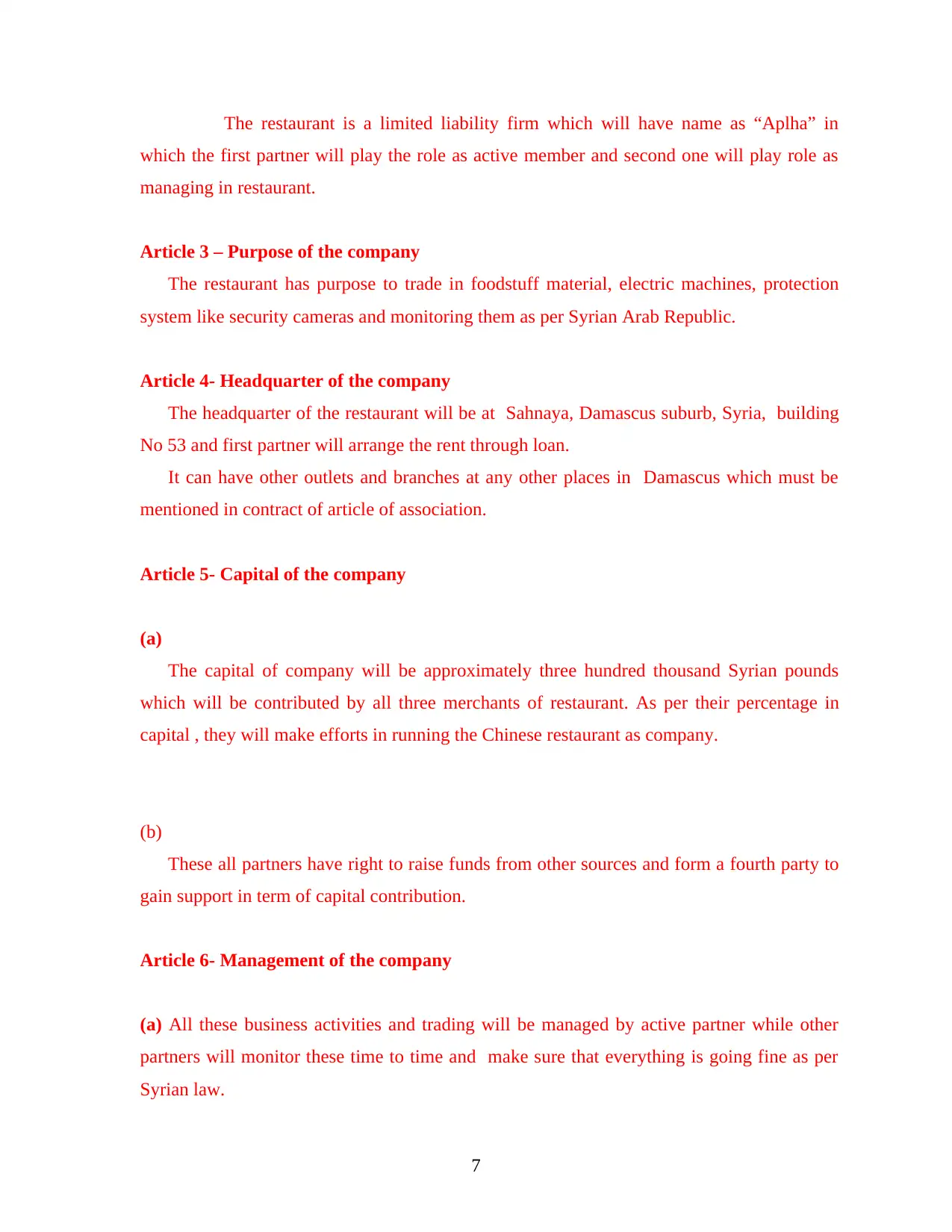
The restaurant is a limited liability firm which will have name as “Aplha” in
which the first partner will play the role as active member and second one will play role as
managing in restaurant.
Article 3 – Purpose of the company
The restaurant has purpose to trade in foodstuff material, electric machines, protection
system like security cameras and monitoring them as per Syrian Arab Republic.
Article 4- Headquarter of the company
The headquarter of the restaurant will be at Sahnaya, Damascus suburb, Syria, building
No 53 and first partner will arrange the rent through loan.
It can have other outlets and branches at any other places in Damascus which must be
mentioned in contract of article of association.
Article 5- Capital of the company
(a)
The capital of company will be approximately three hundred thousand Syrian pounds
which will be contributed by all three merchants of restaurant. As per their percentage in
capital , they will make efforts in running the Chinese restaurant as company.
(b)
These all partners have right to raise funds from other sources and form a fourth party to
gain support in term of capital contribution.
Article 6- Management of the company
(a) All these business activities and trading will be managed by active partner while other
partners will monitor these time to time and make sure that everything is going fine as per
Syrian law.
7
which the first partner will play the role as active member and second one will play role as
managing in restaurant.
Article 3 – Purpose of the company
The restaurant has purpose to trade in foodstuff material, electric machines, protection
system like security cameras and monitoring them as per Syrian Arab Republic.
Article 4- Headquarter of the company
The headquarter of the restaurant will be at Sahnaya, Damascus suburb, Syria, building
No 53 and first partner will arrange the rent through loan.
It can have other outlets and branches at any other places in Damascus which must be
mentioned in contract of article of association.
Article 5- Capital of the company
(a)
The capital of company will be approximately three hundred thousand Syrian pounds
which will be contributed by all three merchants of restaurant. As per their percentage in
capital , they will make efforts in running the Chinese restaurant as company.
(b)
These all partners have right to raise funds from other sources and form a fourth party to
gain support in term of capital contribution.
Article 6- Management of the company
(a) All these business activities and trading will be managed by active partner while other
partners will monitor these time to time and make sure that everything is going fine as per
Syrian law.
7
⊘ This is a preview!⊘
Do you want full access?
Subscribe today to unlock all pages.

Trusted by 1+ million students worldwide
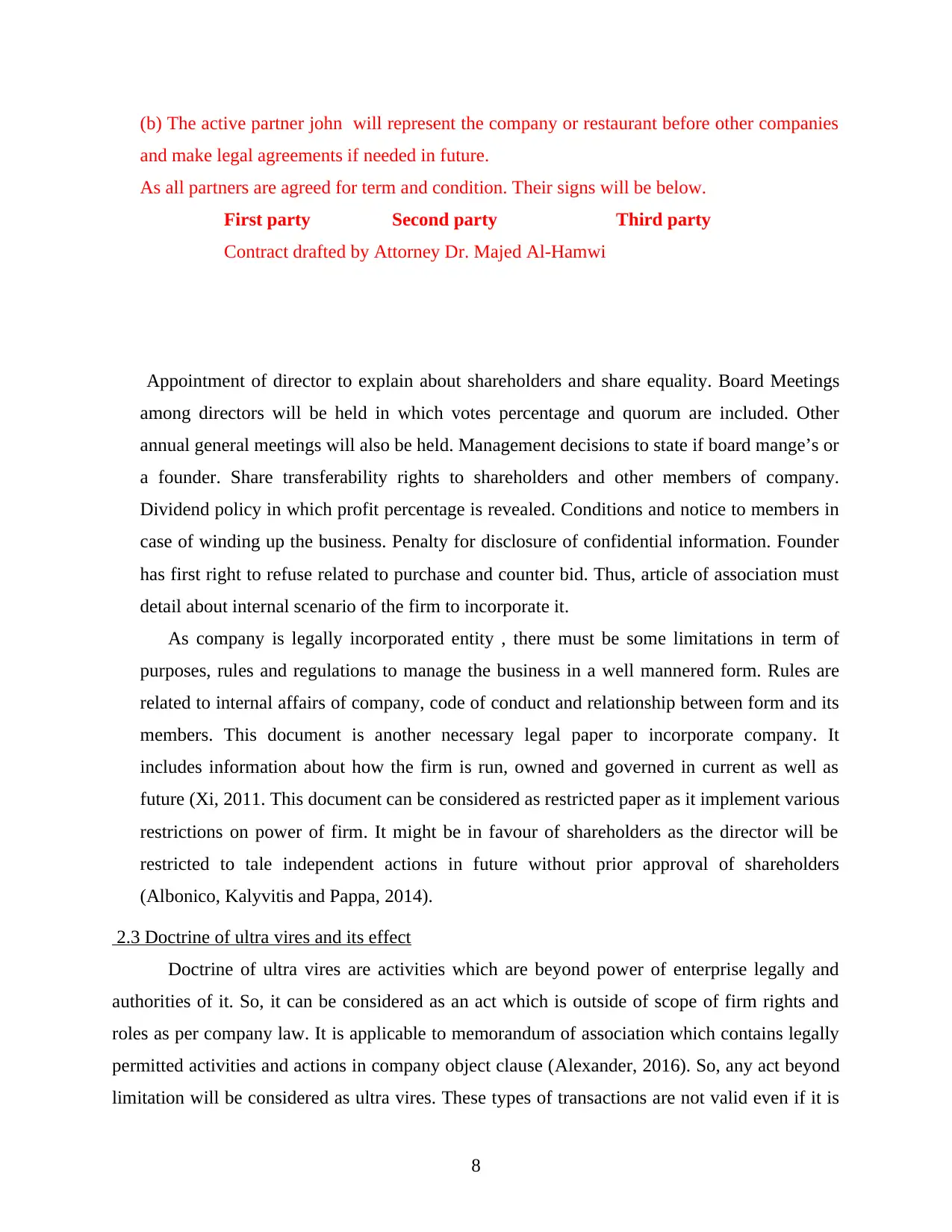
(b) The active partner john will represent the company or restaurant before other companies
and make legal agreements if needed in future.
As all partners are agreed for term and condition. Their signs will be below.
First party Second party Third party
Contract drafted by Attorney Dr. Majed Al-Hamwi
Appointment of director to explain about shareholders and share equality. Board Meetings
among directors will be held in which votes percentage and quorum are included. Other
annual general meetings will also be held. Management decisions to state if board mange’s or
a founder. Share transferability rights to shareholders and other members of company.
Dividend policy in which profit percentage is revealed. Conditions and notice to members in
case of winding up the business. Penalty for disclosure of confidential information. Founder
has first right to refuse related to purchase and counter bid. Thus, article of association must
detail about internal scenario of the firm to incorporate it.
As company is legally incorporated entity , there must be some limitations in term of
purposes, rules and regulations to manage the business in a well mannered form. Rules are
related to internal affairs of company, code of conduct and relationship between form and its
members. This document is another necessary legal paper to incorporate company. It
includes information about how the firm is run, owned and governed in current as well as
future (Xi, 2011. This document can be considered as restricted paper as it implement various
restrictions on power of firm. It might be in favour of shareholders as the director will be
restricted to tale independent actions in future without prior approval of shareholders
(Albonico, Kalyvitis and Pappa, 2014).
2.3 Doctrine of ultra vires and its effect
Doctrine of ultra vires are activities which are beyond power of enterprise legally and
authorities of it. So, it can be considered as an act which is outside of scope of firm rights and
roles as per company law. It is applicable to memorandum of association which contains legally
permitted activities and actions in company object clause (Alexander, 2016). So, any act beyond
limitation will be considered as ultra vires. These types of transactions are not valid even if it is
8
and make legal agreements if needed in future.
As all partners are agreed for term and condition. Their signs will be below.
First party Second party Third party
Contract drafted by Attorney Dr. Majed Al-Hamwi
Appointment of director to explain about shareholders and share equality. Board Meetings
among directors will be held in which votes percentage and quorum are included. Other
annual general meetings will also be held. Management decisions to state if board mange’s or
a founder. Share transferability rights to shareholders and other members of company.
Dividend policy in which profit percentage is revealed. Conditions and notice to members in
case of winding up the business. Penalty for disclosure of confidential information. Founder
has first right to refuse related to purchase and counter bid. Thus, article of association must
detail about internal scenario of the firm to incorporate it.
As company is legally incorporated entity , there must be some limitations in term of
purposes, rules and regulations to manage the business in a well mannered form. Rules are
related to internal affairs of company, code of conduct and relationship between form and its
members. This document is another necessary legal paper to incorporate company. It
includes information about how the firm is run, owned and governed in current as well as
future (Xi, 2011. This document can be considered as restricted paper as it implement various
restrictions on power of firm. It might be in favour of shareholders as the director will be
restricted to tale independent actions in future without prior approval of shareholders
(Albonico, Kalyvitis and Pappa, 2014).
2.3 Doctrine of ultra vires and its effect
Doctrine of ultra vires are activities which are beyond power of enterprise legally and
authorities of it. So, it can be considered as an act which is outside of scope of firm rights and
roles as per company law. It is applicable to memorandum of association which contains legally
permitted activities and actions in company object clause (Alexander, 2016). So, any act beyond
limitation will be considered as ultra vires. These types of transactions are not valid even if it is
8
Paraphrase This Document
Need a fresh take? Get an instant paraphrase of this document with our AI Paraphraser
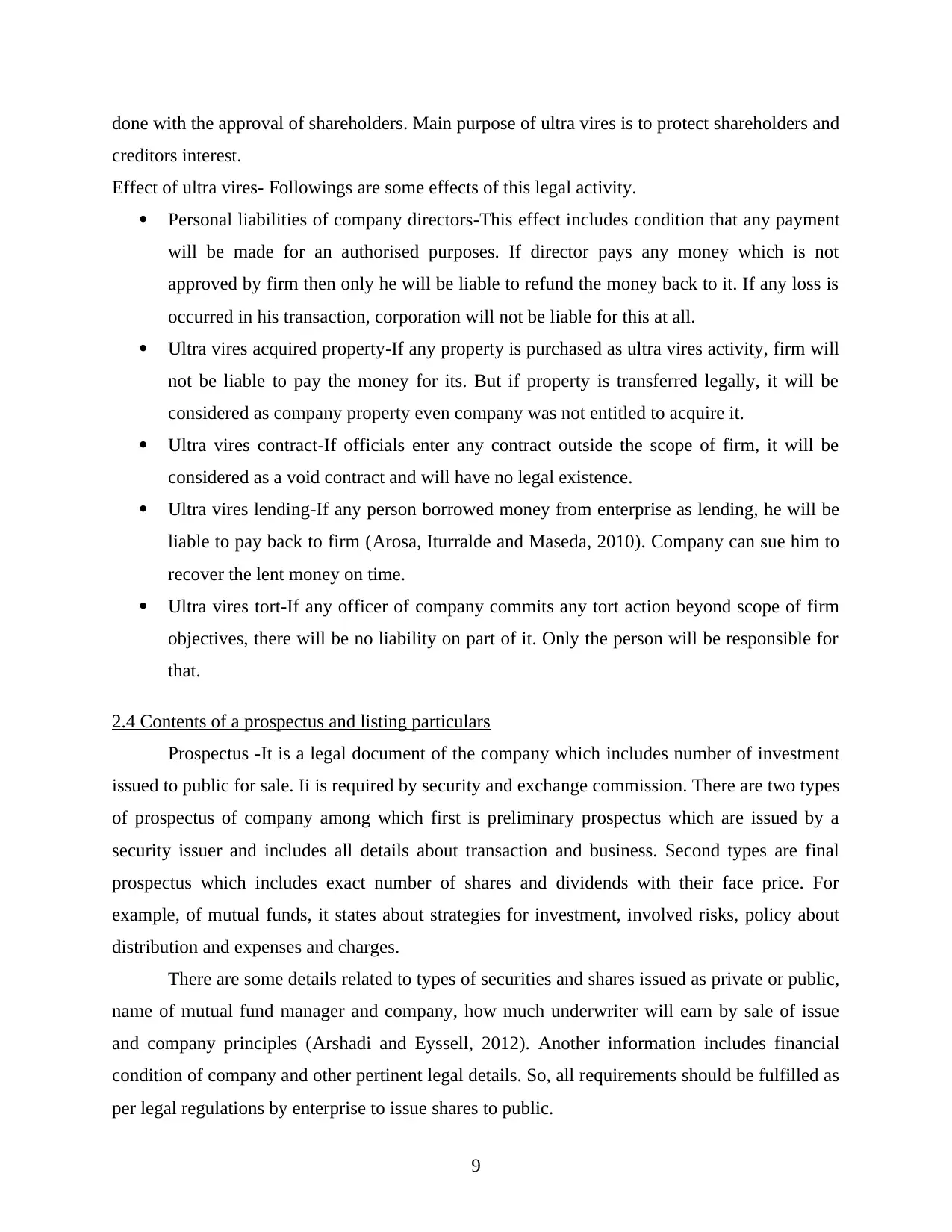
done with the approval of shareholders. Main purpose of ultra vires is to protect shareholders and
creditors interest.
Effect of ultra vires- Followings are some effects of this legal activity.
Personal liabilities of company directors-This effect includes condition that any payment
will be made for an authorised purposes. If director pays any money which is not
approved by firm then only he will be liable to refund the money back to it. If any loss is
occurred in his transaction, corporation will not be liable for this at all.
Ultra vires acquired property-If any property is purchased as ultra vires activity, firm will
not be liable to pay the money for its. But if property is transferred legally, it will be
considered as company property even company was not entitled to acquire it.
Ultra vires contract-If officials enter any contract outside the scope of firm, it will be
considered as a void contract and will have no legal existence.
Ultra vires lending-If any person borrowed money from enterprise as lending, he will be
liable to pay back to firm (Arosa, Iturralde and Maseda, 2010). Company can sue him to
recover the lent money on time.
Ultra vires tort-If any officer of company commits any tort action beyond scope of firm
objectives, there will be no liability on part of it. Only the person will be responsible for
that.
2.4 Contents of a prospectus and listing particulars
Prospectus -It is a legal document of the company which includes number of investment
issued to public for sale. Ii is required by security and exchange commission. There are two types
of prospectus of company among which first is preliminary prospectus which are issued by a
security issuer and includes all details about transaction and business. Second types are final
prospectus which includes exact number of shares and dividends with their face price. For
example, of mutual funds, it states about strategies for investment, involved risks, policy about
distribution and expenses and charges.
There are some details related to types of securities and shares issued as private or public,
name of mutual fund manager and company, how much underwriter will earn by sale of issue
and company principles (Arshadi and Eyssell, 2012). Another information includes financial
condition of company and other pertinent legal details. So, all requirements should be fulfilled as
per legal regulations by enterprise to issue shares to public.
9
creditors interest.
Effect of ultra vires- Followings are some effects of this legal activity.
Personal liabilities of company directors-This effect includes condition that any payment
will be made for an authorised purposes. If director pays any money which is not
approved by firm then only he will be liable to refund the money back to it. If any loss is
occurred in his transaction, corporation will not be liable for this at all.
Ultra vires acquired property-If any property is purchased as ultra vires activity, firm will
not be liable to pay the money for its. But if property is transferred legally, it will be
considered as company property even company was not entitled to acquire it.
Ultra vires contract-If officials enter any contract outside the scope of firm, it will be
considered as a void contract and will have no legal existence.
Ultra vires lending-If any person borrowed money from enterprise as lending, he will be
liable to pay back to firm (Arosa, Iturralde and Maseda, 2010). Company can sue him to
recover the lent money on time.
Ultra vires tort-If any officer of company commits any tort action beyond scope of firm
objectives, there will be no liability on part of it. Only the person will be responsible for
that.
2.4 Contents of a prospectus and listing particulars
Prospectus -It is a legal document of the company which includes number of investment
issued to public for sale. Ii is required by security and exchange commission. There are two types
of prospectus of company among which first is preliminary prospectus which are issued by a
security issuer and includes all details about transaction and business. Second types are final
prospectus which includes exact number of shares and dividends with their face price. For
example, of mutual funds, it states about strategies for investment, involved risks, policy about
distribution and expenses and charges.
There are some details related to types of securities and shares issued as private or public,
name of mutual fund manager and company, how much underwriter will earn by sale of issue
and company principles (Arshadi and Eyssell, 2012). Another information includes financial
condition of company and other pertinent legal details. So, all requirements should be fulfilled as
per legal regulations by enterprise to issue shares to public.
9
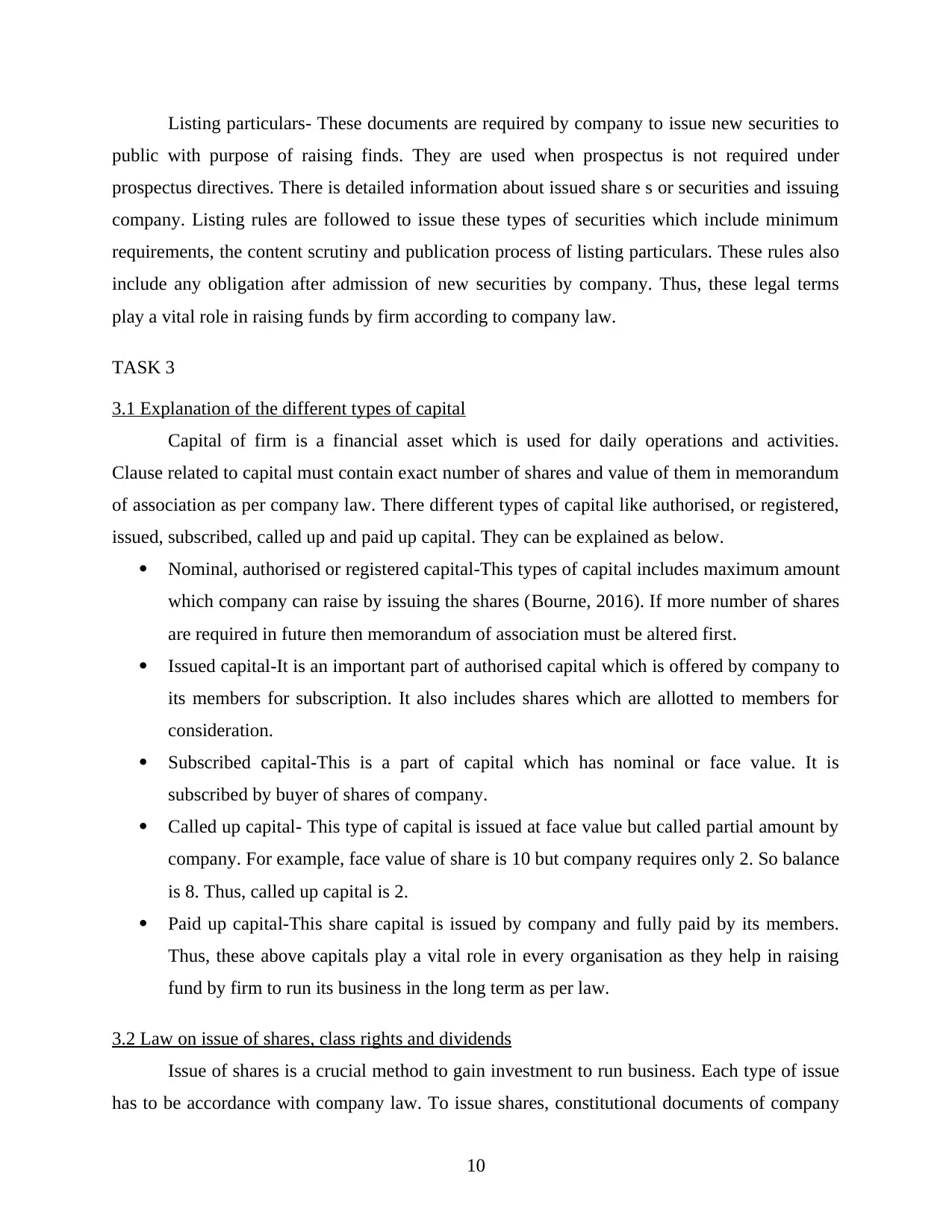
Listing particulars- These documents are required by company to issue new securities to
public with purpose of raising finds. They are used when prospectus is not required under
prospectus directives. There is detailed information about issued share s or securities and issuing
company. Listing rules are followed to issue these types of securities which include minimum
requirements, the content scrutiny and publication process of listing particulars. These rules also
include any obligation after admission of new securities by company. Thus, these legal terms
play a vital role in raising funds by firm according to company law.
TASK 3
3.1 Explanation of the different types of capital
Capital of firm is a financial asset which is used for daily operations and activities.
Clause related to capital must contain exact number of shares and value of them in memorandum
of association as per company law. There different types of capital like authorised, or registered,
issued, subscribed, called up and paid up capital. They can be explained as below.
Nominal, authorised or registered capital-This types of capital includes maximum amount
which company can raise by issuing the shares (Bourne, 2016). If more number of shares
are required in future then memorandum of association must be altered first.
Issued capital-It is an important part of authorised capital which is offered by company to
its members for subscription. It also includes shares which are allotted to members for
consideration.
Subscribed capital-This is a part of capital which has nominal or face value. It is
subscribed by buyer of shares of company.
Called up capital- This type of capital is issued at face value but called partial amount by
company. For example, face value of share is 10 but company requires only 2. So balance
is 8. Thus, called up capital is 2.
Paid up capital-This share capital is issued by company and fully paid by its members.
Thus, these above capitals play a vital role in every organisation as they help in raising
fund by firm to run its business in the long term as per law.
3.2 Law on issue of shares, class rights and dividends
Issue of shares is a crucial method to gain investment to run business. Each type of issue
has to be accordance with company law. To issue shares, constitutional documents of company
10
public with purpose of raising finds. They are used when prospectus is not required under
prospectus directives. There is detailed information about issued share s or securities and issuing
company. Listing rules are followed to issue these types of securities which include minimum
requirements, the content scrutiny and publication process of listing particulars. These rules also
include any obligation after admission of new securities by company. Thus, these legal terms
play a vital role in raising funds by firm according to company law.
TASK 3
3.1 Explanation of the different types of capital
Capital of firm is a financial asset which is used for daily operations and activities.
Clause related to capital must contain exact number of shares and value of them in memorandum
of association as per company law. There different types of capital like authorised, or registered,
issued, subscribed, called up and paid up capital. They can be explained as below.
Nominal, authorised or registered capital-This types of capital includes maximum amount
which company can raise by issuing the shares (Bourne, 2016). If more number of shares
are required in future then memorandum of association must be altered first.
Issued capital-It is an important part of authorised capital which is offered by company to
its members for subscription. It also includes shares which are allotted to members for
consideration.
Subscribed capital-This is a part of capital which has nominal or face value. It is
subscribed by buyer of shares of company.
Called up capital- This type of capital is issued at face value but called partial amount by
company. For example, face value of share is 10 but company requires only 2. So balance
is 8. Thus, called up capital is 2.
Paid up capital-This share capital is issued by company and fully paid by its members.
Thus, these above capitals play a vital role in every organisation as they help in raising
fund by firm to run its business in the long term as per law.
3.2 Law on issue of shares, class rights and dividends
Issue of shares is a crucial method to gain investment to run business. Each type of issue
has to be accordance with company law. To issue shares, constitutional documents of company
10
⊘ This is a preview!⊘
Do you want full access?
Subscribe today to unlock all pages.

Trusted by 1+ million students worldwide
1 out of 20
Related Documents
Your All-in-One AI-Powered Toolkit for Academic Success.
+13062052269
info@desklib.com
Available 24*7 on WhatsApp / Email
![[object Object]](/_next/static/media/star-bottom.7253800d.svg)
Unlock your academic potential
Copyright © 2020–2026 A2Z Services. All Rights Reserved. Developed and managed by ZUCOL.





